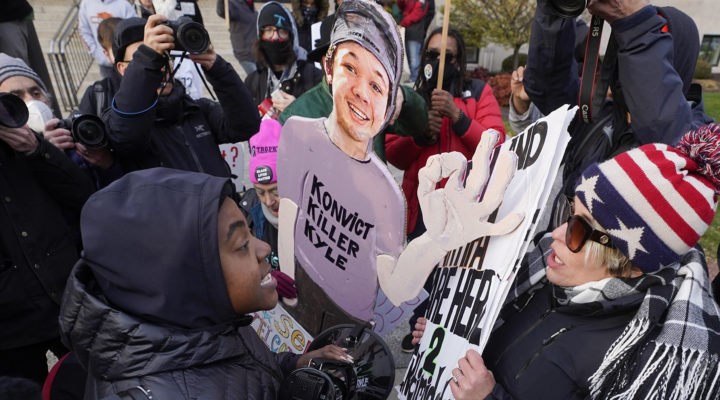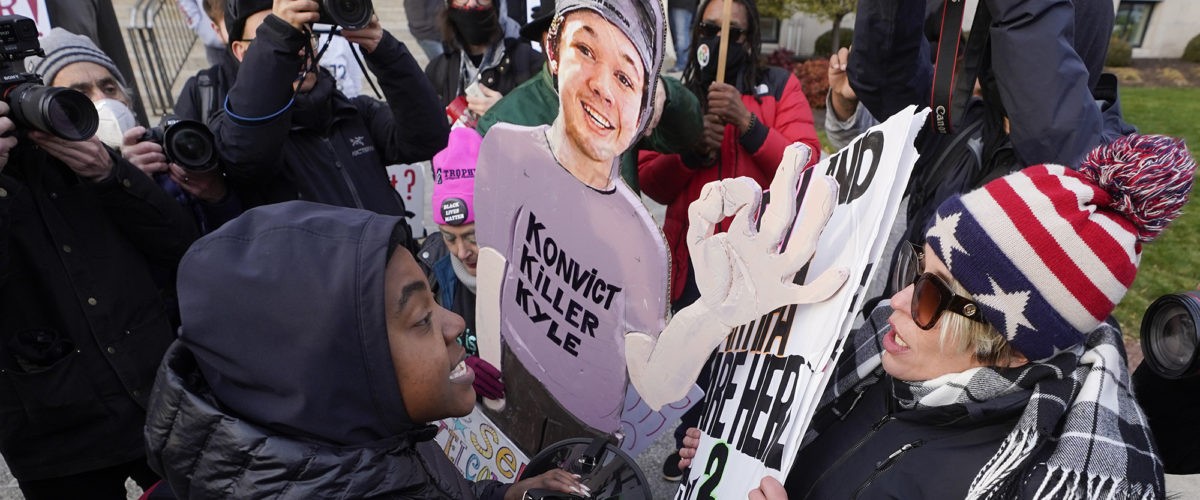As if leading congregations through the troubled waters of COVID-19 weren’t enough, now self-appointed watchdogs are fact-checking sermons of pastors they deem to be working against the conservative political narrative.
Matthew Tennant, senior minister at University Baptist Church in Charlottesville, Va., learned that the hard way this week. His sermon from Sunday morning, Nov. 14, drew the ire of two critics outside the church who publicly accused him of “lying” in his sermon. One of them posted a 14-second clip of the offending portion of the sermon online.

Matthew Tennant
The critics appear to be defenders of accused murderer Kyle Rittenhouse, currently on trial in Wisconsin for shooting three men in Kenosha, Wis., last year, killing two and wounding the third. White supremacists have defended the then 17-year-old’s actions as self-defense, which is his own defense at trial. Others believe Rittenhouse is guilty of a racism-inspired murder while acting as vigilante justice.
In his sermon on the biblical character Hannah, Tennant presented as an illustration a list of “bad news” in the world. Amid that list, he said, “A white teenaged vigilante traveled from Illinois to Wisconsin with an assault rifle and killed two Black protestors is on trial in Kenosha, Wis.”
This comment was not the main point of the sermon, merely a passing illustration. But it was enough for the outside critics to jump on and call him out for what one called a “virtue-signaling verbal mini-treatise on the trial of Kyle Rittenhouse” that represented a “grave error.”
One of the online critics — who hosts a political broadcast with 108 subscribers — also criticized the pastor for denying that ivermectin is a cure for COVID-19, for affirming the reality of climate change and for discussing race.
“Wantonly spreading racially inflammatory disinformation from the pulpit is a serious injustice not only toward Mr. Rittenhouse, as his trial continues, but also to the community of Charlottesville, which does not need any more ‘pastors’ stirring up racial animosity,” this critic posted. “A public retraction and repentance would go a long way toward salvaging Dr. Tennant’s reputation — and is the least that Mr. Rittenhouse and the Charlottesville Community deserve.
Two days after the sermon, Tennant issued a public correction to his sermon while pointing out the divisive nature of American life today.
Tennant issued a public correction to his sermon while pointing out the divisive nature of American life today.
“On Sunday, I made a mistake in my sermon,” he wrote to the congregation. “As part of a list of bad news in the world, I said, ‘A white teenaged vigilante travelled from Illinois to Wisconsin with an assault rifle and killed two Black protestors is on trial in Kenosha, Wis.’
I was wrong. The white teenager shot three white people. The three victims (Joseph Rosenbaum, Anthony Huber and Gaige Grosskreutz) were white. The teenager on trial killed Rosenbaum and Huber. Saying they were Black was my mistake, and I hate to have given any inaccurate information.”
Upon reflection, the pastor added, “my misstep ended up highlighting the point I was trying to make. I was talking about the bad news that monopolizes the news cycle and the challenge of finding hope in this broken world.”
The church received two emails and two phone calls from people protesting his misstatement in the sermon. One of them declared that Tennant would “rot in hell for this.”
“Neither the callers nor the people who emailed are members or regular attenders of the church,” Tennant said. “From what we can tell, none of them had any previous connection with UBC. But their anger demonstrates the division in our country. The vitriol shows the deep feelings people have and the need for us to find ways to share God’s love in this polarized moment.”
“The vitriol shows the deep feelings people have and the need for us to find ways to share God’s love in this polarized moment.”
University Baptist Church sits adjacent to the campus of the University of Virginia, where white supremacists in 2017 marched across campus carrying tiki torches and chanting Nazi slogans.
“Addressing current events, especially divisive ones, sounds too political to some people. However, when we avoid anything with a whiff (or stench) of politics, we compartmentalize Jesus and risk a disingenuous reading of the Gospels,” the pastor said. “Almost everything Jesus did had political connotations.”
He added: “Sharing love and inclusion in a world of pain will bring push back. When someone feels threatened or cast aside, their fight or flight instinct will kick in. People like the Illinois teenager who traveled to Kenosha, Wis., need God’s love too. There’s a reason he felt like he needed to protect businesses, even though they say they did not ask him to protect it.”
Tennant’s own pledge is to “try to do a better job of verifying the facts before saying something. … When my error distracts anyone from hearing this important message, I need to apologize and commit to doing everything I can to avoid repeating mistakes in the future.”
In the meantime, “we have work to do,” he said. “For my part, I will try to be more accurate when referencing current events. I will also commit to double my effort to apply the gospel to our world. Recently, we have been trying very hard to reach new people. In an ironic twist, we appear to have succeeded this week.”
Related articles:
Some pastors face big challenges preaching on Charlottesville, white supremacy
After Charlottesville, it’s past time for The Conversation | Opinion by Timothy Peoples
Secret police then, secret police now | Opinion by Angela Parker


